You can now add Healthify as a preferred source on Google. Click here to see us when you search Google.
Depression – children and teenagers
How to support a child or teenager with depression
Key points about depression in children and teenagers
- Depression (mate pāpouri) doesn't just affect adults – it also happens for children and teenagers.
- The signs can look a little different, often showing up as anger, tiredness or pulling away from others – not just sadness.
- As a parent, there’s lots you can do to support the mental wellbeing of your child or teenager, and places you can ask for help if you need it.
- Treatment options that help the most include talking therapy and lifestyle changes.
- There's lots of support available including free helplines, websites and apps.
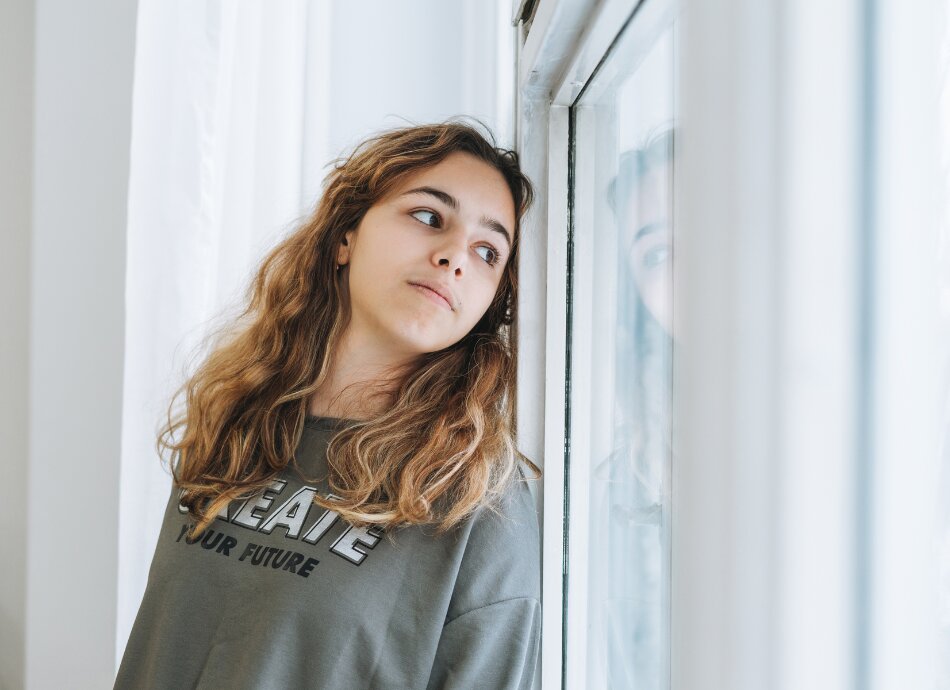
It’s fairly normal for children and teenagers to feel sad or miserable sometimes – it’s an expected part of the growth journey as they learn to deal with challenges at school, with friends, or at home. But depression is different to a sad or bad mood – it’s an illness, and its symptoms can last for a long time. Depression can make it hard for your child to continue engaging with their day-to-day life.
If you’re worried your child or teenager may be depressed, and you're still concerned even after trying some of the ideas on this page, see your healthcare provider. The sooner your child or teenager gets treatment, the sooner they’ll start to feel better. The longer depression goes untreated the more likely it is to disrupt your child’s life and be harder to recover from.
There’s a range of effective treatments for depression. These usually focus on lifestyle changes and talk therapy. There are also heaps of great community and online programmes and support groups available.
There are lots of things you as a parent can do to help: start a conversation if you notice ongoing changes in their mood, support their emotional wellbeing by prioritising a healthy lifestyle at home, and reduce conflict and hostility at home, which are known to make low mood worse in young people.
When and where to get help
When young people have been feeling depressed they might start thinking that they don’t want to be alive, especially if they’re feeling hopeless or stuck and that things won’t change. If they’re having thoughts about no longer wanting to live, get help from your healthcare provider or free phone or text 1737(external link) from any landline or mobile phone, 24 hours a day, 7 days a week.
If your child is experiencing a mental health crisis or you feel they’re in immediate danger, you can also call 111 or go to your hospital emergency department.
Find more places to get support for depression.
It’s normal for young people to be anxious, sad or angry at times. However, if your child or teenager has had several of the following signs over the past few weeks or months and it’s making it hard for them to do everyday things (such as study or socialise), depression is a possibility.
Symptoms of depression can include:
- being irritable and snapping at others
- low, sad or depressed mood that doesn't go away
- crying easily and often
- pulling away from family and friends
- having less interest in schoolwork and not wanting to go to school
- feeling tired all the time and lacking in energy
- feeling stressed or anxious
- being overwhelmed and thinking negatively about the future
- no longer enjoying activities they usually would
- having trouble thinking, making decisions and remembering things
- having trouble sleeping (insomnia) or sleeping too much
- moving, responding and talking very slowly
- changes in eating habits resulting in weight loss or gain
- muscle tension and headaches
- unexplained physical complaints, especially stomach pains
- being agitated, jittery and pacing
- self-harming through reckless behaviour (with drugs, alcohol or sexual activity) or self-injury.
Depression in young people can present as irritability and anger. They may tell you to back off or go away. This anger can be mistaken for typical moodiness or behaviour difficulties.
Young people may not recognise their problem as depression or, if they do, may feel unable to talk about it. Often the feelings that come with depression are so strong they don’t tell anyone else because they feel worthless, they’re scared they’re going mad, or they think that no one will believe or support them. They may choose to tell their friends before they’re able to talk to adults. If you notice symptoms that concern you, ask your child about them.
There is a strong association between depression in young people and anxiety, conduct disorders, substance abuse, attention-deficit/hyperactivity disorder (ADHD) and eating disorders. These other problems can happen at the same time as depression or can look similar to depression. This is another reason to see your healthcare provider as soon as possible if you have any concerns about the mental health of your child or teenager.
Usually, there’s no single cause of depression in children and teenagers. Sometimes depression appears out of the blue, but at other times something seems to trigger it. Often it’s a combination of factors. Your child or teenager is more likely to experience depression if they:
- experience a stressful event such as the break-up of parents, loss of a loved one or relationship break-up
- have someone in the family who has depression, such as a parent or sibling
- have experienced trauma, such as a significant injury or accident, or abuse
- are going through major life changes, such as starting a new school
- have a significant physical illness or disability, including neurodevelopmental conditions such as autism or ADHD
- have a poor daily routine or aren’t involved in school, training or work
- spend a lot of time online, especially on social media
- have been bullied or had other problems with peers
- are LGBTQI+ or feel different in some other way and don’t have access to support and safe environments to express or explore this
- use alcohol or recreational drugs.
Start a conversation
You can help your child or teenager by starting conversations if you notice ongoing changes in their mood. Choose a private moment when both you and your child are calm to ask them how they are. Let them know they can tell you anything, and that you’re there to support them, no matter what. Listening well and not taking over the conversation will support them to feel it’s a safe space where they can share.
You can create a family culture of talking openly about feelings – you don’t need to wait for things to be hard to start this.
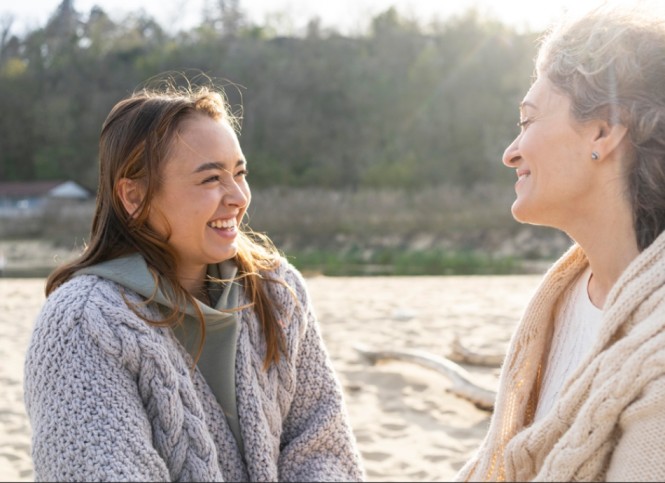
Image credit: Freepik
Build a support network
If your child or teenager doesn’t want to open up to you, try not to take it personally – encourage them to talk with another trusted adult such as a whānau member, school guidance counsellor or healthcare provider. They may prefer to talk with their friends about what is going on for them, so let their friends know they can call on you for support if they’re worried.
Social media can be a helpful place for young people to connect with each other, but personal stories should be balanced against professional advice. Encourage your teenager to check any advice against reliable sources.
Encourage a healthy lifestyle
Research shows that improvements to key aspects of lifestyle can greatly affect mood. This includes sleep, food, exercise and the use of alcohol or drugs. As a parent, you can support their emotional wellbeing by making sure you all have a healthy lifestyle at home:
- having meals together
- eating healthy food
- having daily physical activity
- limiting screen time, and
- making sure they get plenty of sleep.
A great way to do this is to model the behaviours you’d like your child to take on, such as putting your own phone away at mealtimes, talking about how your day is going, and making sure you get some exercise.
Make home a safe space
Conflict and hostility at home are known to make low mood worse in young people. When whānau can work together in positive ways this supports children’s emotional wellbeing. Relationship breakdowns do happen, but if you’re going through a separation or divorce, do your best to ensure your child feels secure and loved, and speak respectfully about the other parent in front of them.
Providing extra support during and after any hard or stressful times can help to protect your child or teenager from depression or lessen the effects.
Treatment plan
If your child or teenager has a treatment plan developed with a healthcare provider, make sure you follow the suggestions in it closely. If you don’t have a plan and think your child would benefit from one, talk to your healthcare provider – this might be particularly helpful if your child has been diagnosed with more than one condition or has other health concerns.
Other ways to support your child
Keep your child connected by including them in usual family activities, even if it seems like they don’t want to be. Be gentle and patient with them and focus on their wellbeing – this might include adjusting your expectations of what success looks like for them this during this time (especially with schoolwork).
Learn about depression (see the related topics and more information sections below), especially if you haven’t experienced it yourself. If you’re looking for support from a health professional, finding someone you trust and you think will understand your child matters. You’re always allowed to ask for a second opinion. Some areas also have services dedicated to specific cultural groups – ask your healthcare provider for a recommendation.
If you’re worried your child or teenager may be depressed, see your healthcare provider. They’ll ask your child questions about their thoughts, feelings and behaviour, including sleeping and eating patterns, as well as how long they’ve been feeling this way. They’ll also ask about any previous episodes of depression and what’s happening in their life at the moment. They may also do a physical examination and order blood tests to rule out other causes for their depression.
It's important to involve family members where possible when assessing and treating depression. This can become more challenging with teenagers, although it's still very important. For young people under 16 years of age, parents need to be involved in the consent process.
The good news is that there’s a range of effective treatments for depression – it's a treatable illness. Treatment usually focuses on psychological therapies and lifestyle changes. Antidepressants aren’t routinely used for children and young people but may be added in some cases if depression doesn't respond to other treatments. Your healthcare provider will be able to talk through options and help work out which are best for your child or teenager. They may also refer them to a mental health specialist. Read more about mental health services for youth below.
Talking therapy
The most common treatment is talking therapy. Counsellors and therapists will be supportive and understand what's happening to your child. They can offer help with thinking patterns and anxiety, problem-solving skills and self-esteem, as well as any other problems that might be contributing to their depression. Some of the therapy sessions may involve the child or teenager on their own and some usually involve meetings with parents and/or other whānau members.
Your healthcare provider will know what counselling and therapy is available in your local area. This is free for children under 14 years of age, while 14 to 25-year-olds can get free primary care services through their local Youth One Stop Shop.
If your child or teenager is at school, they can talk to a school guidance counsellor or Hauora Youth mental health worker. Some areas in Aotearoa New Zealand have services for Māori, Pacific and Asian youth – ask your school counsellor about these services.
Online programmes
Your healthcare provider might recommend an online skills programme to help with their treatment. Some of these have been developed in collaboration with therapists and researchers and have been supported by research. However, one of the downsides to this is that it may take young people away from being able to share problems with others, which can be helpful in its own right.
Evidence-based tools developed for an Aotearoa New Zealand-context include:
- SPARX(external link) A free online tool to help young New Zealanders learn to deal with depression and anxiety.
- The Lowdown(external link) A website created to help young people understand and deal with depression, with chat room, personal stories, music and more.
- Aunty Dee(external link) Online problem-solving tool for young people.
Medicines
Sometimes, with more severe depression, medicine may be recommended. While antidepressants do not cure depression, if psychological therapy and lifestyle changes alone haven't worked well, your healthcare provider may add an antidepressant to your child or teenager's treatment plan – these medicines work best in combination with therapy support.
Note: The use of antidepressants has been linked with suicidal thoughts and behaviour. Children, teenagers, young adults and people with a history of suicidal behaviour are particularly at risk. This is most likely during the first few weeks of starting the antidepressant or if the dose is changed. It’s important to look out for signs of suicidal behaviour such as a young person talking about suicide, an increase in self-harm, worsening of low mood, agitation or aggression. If you notice any of these signs, contact your healthcare provider as soon as possible.
Treatment plans
Treatment plans are helpful for you and your child to keep track of things to aim for, or things to manage, especially when there are other health conditions and medicines involved. Having a good plan to manage long-term needs, and sticking to it, is an important part of treatment and a helpful tool for supporting mental health. As parents, being involved in this planning can help you feel like part of the treatment team and give you an opportunity to ask questions (eg, "What can we be working on at home?" or "Will this therapy be a good choice for my neurodiverse child?").
Apps reviewed by Healthify
You may find it useful to look at some mental health and wellbeing apps for teenagers and young people.
Find out where you can get support with depression.
Online support
The Lowdown(external link) website has been created to help youth understand and deal with depression. FREE text 5626 or chat online(external link).
SPARX(external link) helps young people learn skills to deal with feeling down, depressed or stressed.
What’s Up(external link) is a safe place for children and young people to ask about anything at all. FREE call 0800 WHATS UP (0800 942 8787) from any NZ phone or chat online(external link).
Small Steps(external link) Whether you’re looking to maintain wellbeing, find relief or get help, Small Steps can support you and your whānau with practical tools, strategies and advice.
Video: SPARX – information for whanau and friends
This video gives a short overview of how SPARX can help a young person in your family/whānau or care.
(SPARX, NZ, 2014)
Helplines
The following numbers are free to call from a New Zealand landline:
Free call or text 1737(external link) any time, 24 hours a day.
Youthline(external link) (0800 376 633) Free helplines 24/7 – free TXT 234, free call 0800 37 66 33, chat online(external link) (10am – 10pm) or email. Youthline provides access to support and help for young people, as well as youth development and leadership programmes. They also offer a counselling service(external link) with up to 8 free counselling sessions (over the phone, face-to-face or via video call), in Auckland.
Kidsline(external link) 0800 543 754 (4pm–9pm weekdays).
Depression line(external link) 0800 111 757 (24 hours, 7 days).
Lifeline(external link) 24 hour telephone counselling 0800 543 354 or 09 522 2999 (within Auckland).
What’s Up(external link) 0800 WHATS UP (0800 942 8787) 12pm-11pm Monday to Friday, 3pm-11pm Weekends, Free to call from both NZ landlines and mobile phones.
Samaritans(external link) 0800 726 666 (24 hours, 7 days).
The following links provide further information about depression in children and teenagers. Note that some resources are from overseas so some details may be different in New Zealand, eg, phone 111 for emergencies or, if it’s not an emergency, freephone Healthline 0800 611 116.
Depression(external link) KidsHealth, NZ, 2022
Depression – youth(external link) Mental Health Foundation, NZ, 2022
depression.org.nz(external link)
Understanding and dealing with depression – for young people(external link) Headspace Australia
Mental Wealth(external link) NZ
Just a thought(external link) NZ
Depression in young people(external link) HealthDirect, Australia
Brochures
Supporting a young person experiencing mental distress(external link) Mental Health Foundation, NZ, 2025 (can be downloaded from this link)
Depression in children(external link) Black Dog Institute, Australia
Supporting young people with stress, anxiety and/or depression(external link) Ministry of Social Development, NZ, 2015
Helplines and local mental health services(external link) Mental Health Foundation, NZ, 2021
Depression in adolescents and young people(external link) Black Dog Institute, Australia, 2012
There is a way through(external link) Health Promotion Agency, NZ, 2025
Depression factsheet(external link) Mental Wealth, NZ, 2019
Talking mental health with young people at secondary school(external link) Anna Freud, National Centre for Children & Families, UK, 2023 (can be downloaded from this link)
Apps
Mental health and wellbeing apps for teenagers and young people
References
- Depression in the LGBTQIA+ population(external link) Healthline, US, 2021
- Online insomnia treatment also prevents depression(external link) UNSW, Australia, 2016
- One hour of exercise a week can prevent depression(external link) UNSW, Australia, 2017
- Supporting a young person experiencing mental distress(external link) Mental Health Foundation, NZ, 2025
- Childhood depression – what parents need to know(external link) Nemours KidsHealth, US, 2021
- Depression in children and young people(external link) NHS, UK, 2023
- Depression in young people(external link) HealthDirect, Australia, 2023
Resources
The role of medicines in the management of depression in primary care(external link) BPAC, NZ, 2017
The role of medicines for the treatment of depression and anxiety in patients aged under 18 years(external link) BPAC, NZ, 2016
Addressing mental health and wellbeing in young people(external link) BPAC, NZ, 2015
Managing frequently encountered mental health problems in young people - non-pharmacological strategies(external link) BPAC, NZ, 2015
Navigating youth mental health(external link) Akohiringa, NZ, 2023
Depression information sheets(external link) Centre for Clinical Interventions, Australia
PHQ-9 (Patient Health Questionnaire 9) modified for teens(external link)
Clinical practice guidelines for mood disorders(external link) Royal Australian and New Zealand College of Psychiatrists, 2015
Podcast
Depression in adolescents – Sally Merry(external link) Goodfellow Unit, 2017
Professor Sally Merry talks about depression in adolescents. Sally holds the Cure Kids Duke Family Chair and is head of Department of Psychological Medicine at The University of Auckland.
See our page Depression for healthcare providers
Brochures
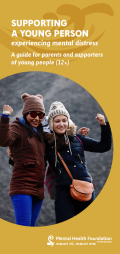
Supporting a young person experiencing mental distress
Mental Health Foundation, NZ, 2025
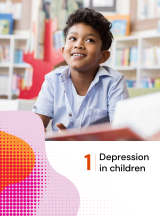
Depression in children
Black Dog Institute, Australia
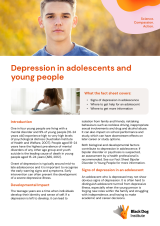
Depression in adolescents and young people
Black Dog Institute, Australia
Credits: Healthify editorial team. Healthify is brought to you by Health Navigator Charitable Trust.
Reviewed by: Rewa Murphy, clinical psychologist
Last reviewed:





